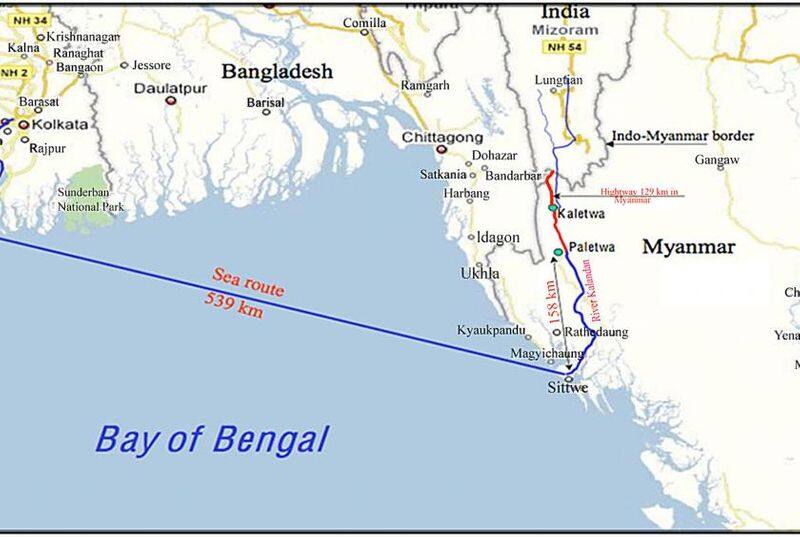Indian army in a joint operation with their counterpart in Myanmar have destroyed at least a dozen terror camps belonging to insurgent groups Arakan Army and NSCN-K (Nationalist Socialist Council of Nagaland -Khaplang).
Yangon: Indian army in a joint operation with their counterpart in Myanmar have destroyed at least a dozen terror camps belonging to insurgent groups Arakan Army and NSCN-K (Nationalist Socialist Council of Nagaland -Khaplang). The two groups were allegedly trying to target the Kaladan infrastructure project that has been undertaken to improve connectivity between north-east India and Kolkata.
The Indian Army carried out this operation along the India-Myanmar border for almost two weeks between February 17 and March 2 and claims to have achieved its desired objective. The forces have not declared an official figure but sources claim that over a dozen camps were destroyed and many insurgents eliminated.
Also read: Myanmar Army crackdown on Northeast insurgents: NSCN-K HQ seized
Interestingly, the entire flush-out operation was silently carried out when the focus was on India's western border which has seen sustained tension following the Pulwama terror attack and India's retaliatory Balakot air strikes. A Jaish-e-Mohammed (JeM) suicide bomber attacked a CRPF cavalcade in Pulwama on February 14, killing more than 40 jawans. It was the biggest terror attack on the Indian security forces in Jammu and Kashmir. In a counter-strike, Indian Air Force (IAF) jets were reported to have hit JeM trainig camps in Pakistan-ocupied Kashmir, killing 250-300 terrorists.
Operation Sunrise
According to a senior official, the joint operation by Indian and Myanmar armies was named Operation Sunrise. It was planned almost two months ago. The action began on February 17 in which the team targeted newly constructed camps set up by the insurgent groups around the border areas of Mizoram.
In the second phase, the team destroyed terror camps of Naga terror group NSCN-K (Nationalist Socialist Council of Nagaland -Khaplang) around the Arunachal Pradesh border, which is more than 1,000 km away from the operation site in Mizoram.
The Assam Rifles – the oldest paramilitary organisation in India — which has been guarding the India-Myanmar border for decades, assisted the special forces and other infantry units of the Indian army. Along with specific ground intelligence, help of modern surveillance equipment like drones was taken to verify the terror camps.
Kaladan Multi Modal Transit Transport Project
The Kaladan Multi Modal Transit Transport Project is one of the most significant ones undertaken by India and Myanmar. The project aims to provide an alternate outlet to the landlocked North-east which is heavily dependent on the narrow ‘Chicken’s Neck’ at Siliguri.
The project worth crores of rupees was under threat from the Arakan Army which had made its base around crucial areas close to the project. The Kaladan project is important as it connects Kolkata to the Sitwe port in Myanmar and helps improve the connectivity with other regions of the North-east. The project will reduce the distance from Kolkata to Mizoram by nearly 1,000 km.
The project will also provide an alternative route to India to ship goods to the landlocked north-eastern states as it will provide access to the sea via Myanmar. It will significantly lower the cost and distance of movement from Kolkata to Mizoram and beyond. It will also reduce dependence on the only route, a narrow strip dubbed as the Chicken’s Neck in Bengal, sandwiched between Bhutan and Bangladesh.
What is Arakan Army
The Arakan Army is an insurgent group which is trained by the Myanmar-based terror outfit, Kachin Independence Army (KIA). According to intelligence gathered by Indian forces, KIA has trained close to 3,000 members of the Arakan Army in the Kachin state of Myanmar which is close to the China border.
The members of the Arakan Army have been trained in setting up improvised explosive devices (IEDs). This is why they are a serious threat to infrastructure projects. The Arakan Army headquarter is in Laiza, which is also in the Kachin state bordering China, and falls close to the sensitive India-China-Myanmar trijunction.
The Arakan Army along with KIA is part of the coalition of insurgent groups called the Northern Alliance, said to be supported by China.
Last Updated Mar 15, 2019, 5:48 PM IST











![Salman Khan sets stage on fire for Anant Ambani, Radhika Merchant pre-wedding festivities [WATCH] ATG](https://static-ai.asianetnews.com/images/01hr1hh8y86gvb4kbqgnyhc0w0/whatsapp-image-2024-03-03-at-12-24-37-pm_100x60xt.jpg)
![Pregnant Deepika Padukone dances with Ranveer Singh at Anant Ambani, Radhika Merchant pre-wedding bash [WATCH] ATG](https://static-ai.asianetnews.com/images/01hr1ffyd3nzqzgm6ba0k87vr8/whatsapp-image-2024-03-03-at-11-45-35-am_100x60xt.jpg)



